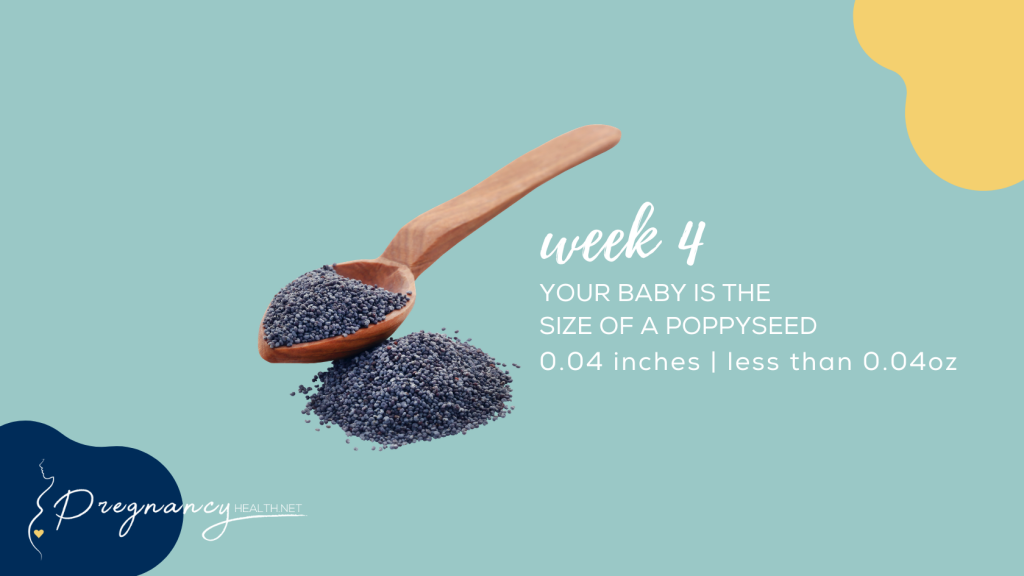Congratulations on your pregnancy! Even though you are very early on your pregnancy journey, it is surely an exciting feeling seeing those two pink lines (or happy face depending on the pregnancy test brand you are using). Some women may not realize that they are pregnant at this point, especially if she has an irregular menstrual cycle and doesn’t realize that she has missed her period. Others feel symptoms immediately. Everybody is different and it is important to honor your own body and not compare to others.
While you have “technically” been pregnant for only 2 weeks, you are considered to be 4-weeks pregnant after the first day of your last menstrual cycle. The egg and sperm met when you ovulated (typically two weeks after your menstrual cycle) and the magic has begun! So, if you are four weeks pregnant on paper, you have only been carrying a baby for two weeks.
In this article, we are going to share some tips and guidance to help you navigate through the first month of pregnancy.
IN THIS ARTICLE
- 1 Month Pregnant Ultrasound
- First Month Pregnancy Symptoms
- Belly Size at 4 Weeks Pregnant
- How big is my baby at 1 month pregnant?
- Shopping List
- Homework for this month
1 Month Pregnant Ultrasound
Many OB/GYNs do not perform prenatal visits until the mother-to-be is at least 8 weeks pregnant depending on the practice. If a women underwent assisted reproduction, is at high-risk, or has another reason, a doctor may see a patient earlier and an ultrasound could possibly be conducted. If you don’t have an opportunity to get an ultrasound at this point, don’t fret. You won’t be missing out on seeing your baby’s 10 little fingers and toes just yet anyways since they are not developed at this point.
At the early stages, the ultrasound is often a transvaginal ultrasound, where a probe is inserted in the vagina. From there, the provider can see what she needs to see.
RELATED STORIES
TMS Therapy During Pregnancy: A Safe Alternative for Treating Depression
Pregnancy is a transformative journey filled with excitement, joy, and anticipation. However, for many…
February 12, 2025Your Biggest Pregnancy Ultrasound Fears (and How They Stack Up Against Reality)
I remember my first pregnancy ultrasound like it happened yesterday. There I was, sitting…
November 24, 2020Does COVID-19 Encourage Pregnant Families to Birth at Home?
For many pregnant families, COVID-19 adds an element of fear to birthing in a…
July 12, 2020First Month Pregnancy Symptoms
While you clearly won’t be showing yet, there are some symptoms you may notice. Bleeding gums, tender breasts, and abdominal pinching (known as implantation pain) may occur. All are completely normal side-effects of your body getting ready to grow a tiny human.
Many of the symptoms you may feel are similar to symptoms women feel before they start their period. From cravings to feeling exhausted, it is no wonder why many women think they are due for another menstrual cycle when in fact they are exhibiting pregnancy symptoms!
The most obvious symptom of pregnancy is a missed period for women with a regular cycle.
Other symptoms to look out for include:
- Feeling dizzy if you stand up quickly
- Feeling tired
- Nausea
- Implantation bleeding (bleeding when baby is setting up her home in your uterus)
- Lower back ache
- Vivid dreams
If you are not experiencing many symptoms, that is not an indicator that there is something wrong. Many women do not experience many symptoms this early in pregnancy.
Belly Size at 4 Weeks Pregnant
No need to rush out to buy maternity pants just yet. Your belly will look very similar to how it looked four weeks ago. You won’t start showing until later on in your pregnancy.
How big is my baby at 1 month pregnant?
Your baby is teeny-tiny by the time you reach your 4th week of pregnancy. Your baby is currently called a blastocyst, which is essentially a collection of cells and is the size of a spot that a ball point pen makes-around 0.04 inches long.

Shopping List
This post contains affiliate link(s). An affiliate link means we may earn an advertising/referral fee if you make a purchase through the link. This is at no extra cost to you and helps us bring you quality content. See our disclosure about affiliate links here.
BUY ON AMAZON | Pink Stork Total Prenatal Vitamins + DHA
During your first few weeks, you want to make sure that you are taking a high-quality prenatal vitamin that contains at least 400 mcg of folic acid. You want to take a prenatal vitamin that provides at least 200 mg of DHA like Pink Stork’s Total Prenatal Vitamins + DHA or take a separate supplement to support
BUY ON AMAZON | Choline Bitartrate 500mg | Prenatal Supplement for Development & Growth | 100% Vegan & Non-GMO Choline
Choline is an important B-vitamin that may play a role in supporting baby’s neural tube development. Ensuring that you are getting in the recommended 450 mg of choline either through your diet or via a supplement is a good idea at this stage.
BUY ON AMAZON | Clearblue Pregnancy Test Combo Pack, 4ct – Digital with Smart Countdown & Rapid Detection
If you have not confirmed pregnancy yet, an over-the-counter pregnancy test is a simple way to learn about your body.
BUY ON AMAZON | Natural Ginger Tummydrops | Certified Oregon Tilth USDA Organic, Non-GMO Project, GFCO Gluten-Free, and Kof-K Kosher
You may want to stock up on some ginger chews in case nausea strikes. Many women complain of nausea during the first trimester, and ginger chews are a wonderful remedy that you can keep in your purse for emergencies.
BUY ON AMAZON | RITUAL ZERO PROOF Tequila Alternative | A Non-Alcoholic Spirit
If you are normally a cocktail person, try a zero proof option like Ritual Zero Proof tequila. It contains zero alcohol but gives the taste and feeling of enjoying tequila.
Homework for this month
At this point, there is not a huge to-do list for your pregnancy. If you haven’t already, call your health care provider to schedule a prenatal appointment. While most providers don’t see pregnant patients until at least their 8th week of pregnancy unless there is a medical reason, it is a good idea to get that appointment on the books.
If you normally smoke cigarettes, drink alcohol, or do recreational drugs, you want to stop right now. Additionally, you want to limit your caffeine intake to 200 mg/day or less.
You also may want to share the news with your partner. Have fun with it and make the announcement special for the both of you!
Related Stories
The First Symptoms of Pregnancy
Nausea (Morning Sickness) During Pregnancy: Causes and Cures
Am I Pregnant? 7 Ways To Tell Sooner
This article is not intended to be a substitute for professional medical advice, diagnosis, or treatment. Always seek the advice of your physician or other qualified health provider with any questions you may have regarding a medical condition. Never disregard professional medical advice or delay in seeking it because of something you have read on this website.









